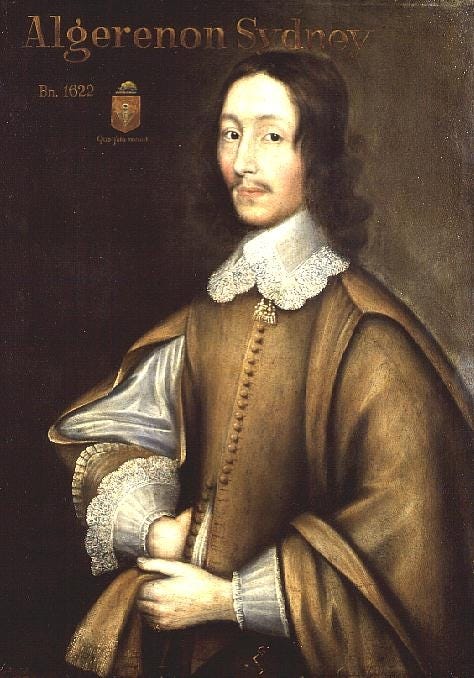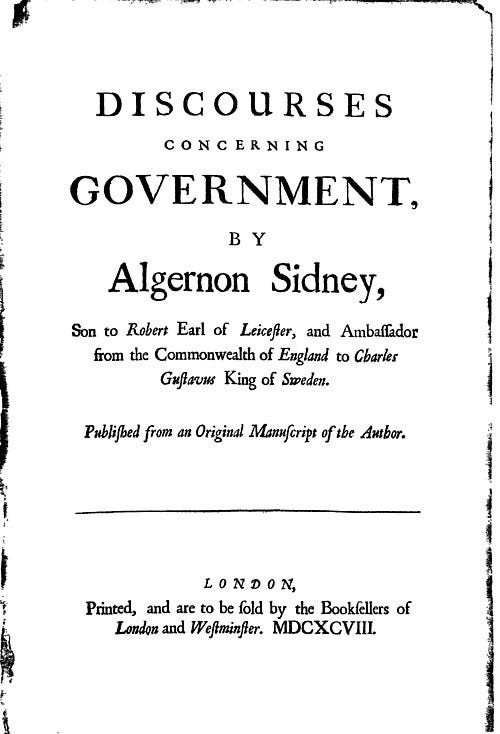Algernon Sidney's Profound Influence on the Founding Fathers
Algernon Sidney’s ideas not only shaped the Declaration of Independence and the revolutionary ethos but also inspired a republican vision that endures in America’s political tradition.
Algernon Sidney (1623–1683) was an English politician, republican political theorist, and soldier whose ideas profoundly influenced the American Founding Fathers, though he is overshadowed by his contemporary, John Locke. Sidney’s Discourses Concerning Government was widely read in the American colonies, often cited alongside John Locke’s Two Treatises of Government as a foundational text for revolutionary thought.
Discourses Concerning Government
Discourses Concerning Government (written 1679–1683, published 1698), was a direct rebuttal to Sir Robert Filmer’s Patriarcha (written 1635-1642, published 1680), which defended the divine right of kings. John Locke’s First Treatise of Government (written 1679-1680, published 1689) was also a direct rebuttal of Patriachia.
In Discourses, Sidney argued that political authority derives from the people, not divine mandate, and that citizens have a natural right to resist tyrannical rule. He championed natural liberty, the rule of law, and the consent of the governed, ideas that resonated deeply with American revolutionaries. The work’s manuscript was used as evidence in Sidney’s 1683 trial for treason, leading to his execution under King Charles II on December 7, 1623, cementing his status as a republican martyr.
Textbook of Revolution
Sidney’s writings, particularly Discourses, became a “textbook of revolution” in the American colonies, inspiring figures like Thomas Jefferson and John Adams. His emphasis on the right to revolt and the principles of republican governance influenced the Declaration of Independence and the broader revolutionary ethos. Despite his lesser modern fame compared to Locke, Sidney’s ideas on liberty and resistance to tyranny were foundational to the American political tradition, deserving equal acknowledgment for their impact on the Founding Fathers.
Sidney’s core ideas in Discourses Concerning Government:
Government by Consent: Sidney argued that political authority derives from the consent of the governed, not divine right or hereditary rule. He saw government as a contract to protect liberty and justice.
Right to Revolution: He asserted that people have a natural right to resist and overthrow tyrannical rulers who violate the social contract, a concept rooted in natural law.
Civic Virtue and Liberty: Sidney emphasized that liberty requires active citizen participation and vigilance to prevent corruption and despotism.
Opposition to Absolute Monarchy: He criticized monarchies like that of Charles II, advocating for mixed government with checks on power, drawing from classical republican traditions.
These ideas, written in response to Robert Filmer’s defense of absolute monarchy, were radical for their time and led to Sidney’s treason charge, as they challenged King Charles II monarchy’s legitimacy.
Influence on America’s Foundation
Sidney’s work was substantially influential to the Founding Fathers, particularly in justifying revolution and shaping republican ideals. His martyrdom, passionate defense of liberty, and early dissemination gave him a unique and powerful impact, rivaling any single thinker in the revolutionary phase (1760s–1776).
Thomas Jefferson was deeply familiar with Sidney’s writings. Jefferson’s library at Monticello included Discourses Concerning Government, and he recommended it in his 1776 reading list for law students, alongside Locke’s Two Treatises of Government. This suggests Sidney’s ideas were part of Jefferson’s intellectual foundation when drafting the Declaration of Independence.
Benjamin Franklin’s library contained works by Sidney, and his political activities aligned with Sidney’s advocacy for balanced government and resistance to arbitrary power. Franklin’s famous quip, “Rebellion to tyrants is obedience to God”, proposed as a motto for the Great Seal, resonates with Sidney’s defense of rebellion against unjust rulers.
John Adams, a leading architect of American independence, explicitly credited Algernon Sidney alongside John Locke as a philosopher of liberty whose ideas fueled the Revolution. In his Defence of the Constitutions (1787), Adams declared, “The great philosophers, such as Sidney, Locke, and others, who have supported the principles of liberty, have been read with pleasure and profit by the people of America.”
Similarly, in a 1775 letter to James Warren, Adams affirmed that “the principles of Sidney and Locke are the true principles of liberty” guiding the colonies. These statements underscore Sidney’s profound influence, positioning him as a thinker whose radical defense of popular sovereignty and resistance to tyranny rivaled Locke’s impact. Sidney’s Discourses Concerning Government provided a blueprint for rebellion and republican governance, shaping Adams’ vision of a balanced government and informing the revolutionary ethos of the Declaration and Constitution.
Algernon Sidney’s ideas not only shaped the Declaration of Independence and the revolutionary ethos but also inspired a republican vision that endures in America’s political tradition. Sidney’s martyrdom under Charles II amplified his impact, casting him as a symbol of resistance to tyranny that resonated deeply with colonists. While Locke provided a theoretical foundation, Sidney’s radical rhetoric and sacrifice galvanized action, making him a cornerstone of the American experiment. Recognizing Sidney’s equal contribution alongside Locke restores a vital voice to the narrative of American liberty, reminding us that the fight for freedom was forged by thinkers who risked everything for the principles we cherish today.


